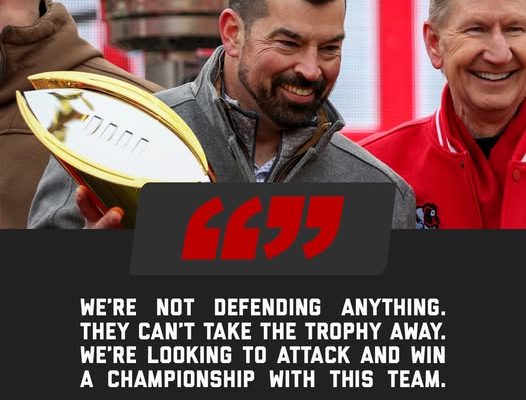**Defending National Champions? No. Attacking National Champions? Yes**
In the world of sports, the term “defending champion” carries a certain prestige. It suggests resilience, consistency, and the ability to withstand the relentless pressure of competition. Yet, there is an inherent flaw in this mindset—one that prioritizes preservation over aggression, reaction over domination. The true mark of a champion is not in their ability to defend, but in their relentless pursuit of attack. Defending implies a passive stance, a waiting game where the opposition dictates the terms. Attacking, on the other hand, is an assertion of dominance, a refusal to relinquish control. The greatest teams and athletes in history were not defined by their ability to hold onto titles, but by their refusal to be anything but the aggressors.
Consider the nature of competition itself. In any sport, the moment a champion shifts into a defensive posture, they invite pressure. Opponents sense vulnerability. The narrative shifts from “Can anyone beat them?” to “How can we exploit their weaknesses?” A defending champion is a target, and the longer they focus on maintaining rather than expanding their dominance, the more likely they are to falter. The most dominant dynasties in sports—Michael Jordan’s Chicago Bulls, Pep Guardiola’s Barcelona, the New England Patriots at their peak—were not content with merely retaining their crowns. They attacked each season, each game, as if they were the challengers, not the holders. They played with a hunger that suggested they had everything to prove, even when they had nothing left to prove.
This philosophy extends beyond sports. In business, politics, and warfare, the same principle applies: the moment an entity shifts from expansion to preservation, decline begins. Companies that rest on their laurels are overtaken by hungrier competitors. Empires that focus on maintaining borders rather than pushing forward collapse under the weight of stagnation. History does not remember those who simply held ground; it remembers those who relentlessly advanced.
The psychological edge of attacking cannot be overstated. A team that sees itself as a defending champion carries the weight of expectation, the fear of losing what they have earned. But a team that attacks plays with freedom, with the confidence that they are the ones setting the standard. The 2015-16 Golden State Warriors, coming off a championship, won a record 73 games not because they were defending anything, but because they played every game as if they were still chasing greatness. Conversely, the same team, when burdened by the label of “defending champions” in the following seasons, struggled with complacency and pressure, proving that mentality dictates outcome.
Even in individual sports, the difference is stark. Tennis legend Serena Williams did not dominate by defending titles; she did so by attacking every tournament as if she had never won before. Her mentality was not to protect her legacy but to add to it. The same can be said of Muhammad Ali, whose greatness was not in his ability to hold onto the heavyweight title, but in his willingness to reclaim it with ferocity after it was taken from him. True champions do not defend—they attack, they reclaim, they conquer anew.
The fallacy of the “defending champion” label is that it implies the battle is already won. But greatness is not static; it is a perpetual motion. The moment a champion stops attacking, they cease to be champions in spirit, even if the title remains technically theirs. The true measure of a winner is not in how long they can hold onto a crown, but in how fiercely they continue to pursue the next one.
So let us retire the notion of defending champions. There are only attackers—those who refuse to be passive, who refuse to let the competition dictate the terms. Whether in sports, business, or life, the only way to stay on top is to keep pushing forward. Because in the end, history does not crown those who defend. It crowns those who attack.



